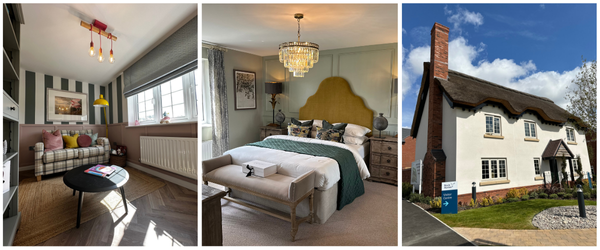Tips for buying a new build home
Buying a newly built home has many advantages. However, the process can still be tricky.
At newhomesforsale.co.uk we have gathered our top home buying tips. Helping you on your home buying journey.
Research the developer
Learning about the developer ahead of committing is always worth it. A great start is to research their past projects and visit one if you can. Check online reviews from real customers on sites like Trust Pilot and Google Reviews.
Is the developer financially stable? People view large, established companies as ‘safer’ than smaller builders. However, it is still important to check their history for your peace of mind.
Visit a show home
If the development you are interested in has a show home, make sure you visit. Show homes are often feature upgrades and dressed up to impress however, it will give you a sense of what could be yours. You are able to request a list of the extras within the homes.
Wondering if you can fit the sofa you've been dreaming about? Take measurements whilst in the space and do not rely on floor plans. Take note of doorways and windows for access if required.
If you are still interested after visiting the show homes, you can ask to see a finished ‘standard spec’ house, if one is available.
Viewing a show home is exciting and you can quickly get carried away with buying a home. To make sure you are making the right decision for you, take lots of photos and videos to review later.

Explore the local area
- Visit the development and surrounding areas at different times throughout the day.
- Try out your commute during peak traffic times.
- What are public transport links like?
- Are there local schools?
- What is nearby? Check out the local amenities such as your nearest supermarkets and GP surgery.
- It is important to consider any future building work on the development or new developments nearby. How will this impact the roads around your home?
- Speak to locals who already live on the development.
- To get a real sense of the environment, we recommend exploring on foot.
Learn what you can change (& budget for extras!)
If you buy a property before it is built, you may be able to choose some finishes. This depends on the stage of construction.
Some restrictions exist. You are unable to make major plumbing changes, add extensions or suggest any other structural changes.
The first thing you should do is ask for a list of what the base price includes, along with a list of upgrades to avoid any hidden costs. Find out when the deadlines are for finalising your decisions. Depending on your choices, anything off-plan can delay the completion date.
Ask about warranties
Is your builder registered with the National House Building Council (NHBC)?
If yes, you will have a warranty of up to 10 years on parts of your house. This covers major structural problems like foundation issues and roof defects. In addition to this, many house builders offer a 2 year warranty for fixtures and fittings. Enquire about this with your builder.
Carefully read all warranty information to understand what it covers. Warranties are not a substitute for inspections and snagging surveys.
Negotiate
…on the purchase price
When buying a new home, many think the listed price is fixed, but there is definitely room to negotiate. This all depends on the developer but many are flexible with price.
If the development is almost finished, has many properties remaining or is near the end of the financial year, you may be in luck.
Check for incentives
Incentives can make a significant difference on your financial outgoings when buying a home. Developers often promote incentives during quieter sales months as well as near the end of the development phase.
Incentives vary between developers but can include deposit contributions, stamp duty payments, upgraded appliances and flooring packages. Depending on the circumstances, you can request outdoor landscaping too, including turf, slabs and plants.
Review the details of any incentives agreement to avoid hidden clauses. Some developers may ask you to use a specific mortgage lender. You might also need to exchange contracts by a certain date to qualify for incentives.
Read the small print
Buying a new build property is a two-way process. Discover what you, the buyer, needs to provide. Developers’ contacts can include clauses about service charges, management fees and leasehold information.
Hiring a solicitor who specialises in new build home purchases is a good idea. They can highlight anything of concern, which may include hidden costs that could affect your long term finances.
You can raise any issue at the start of the process to avoid disagreements further down the line.
Get everything in writing
If your builder says they will change the plan of your home or offer something extra, it is important to get it in writing. This provides evidence and avoids any misunderstanding between parties.
What happens afterwards?
The process of snagging means asking the builder to fix small problems in a new home. This is a common part of buying a new property. It is important to note that not everything will necessarily be included.
Developers expect you, the home owner, to conduct your own snagging list shortly after moving in. This can include paint scuffs and small plumbing issues.
If your property is leasehold or within a managed estate, a management company will maintain shared areas. Learning about these fees from the start can avoid hidden costs.
Developers will continue to offer ongoing support once you have completed. They are on hand to deal with any snags or queries you may have. Keeping records of all communication and requests is important.
Article overview
Buying a new build home has many benefits, but the process can be complex. To ensure a smooth experience, research your builder and the local area thoroughly. Understand which features you can personalise and what changes are allowed. Always read the fine print, measure the space carefully, and ask about warranties such as NHBC coverage. Agree in advance on snagging procedures for post-move-in fixes and get all promises in writing. Prepare for delays with contingency plans and maintain open communication with your builder throughout. Clear expectations and proactive planning help avoid issues and make the buying journey more successful.
Article overview composed with the help of AI
Disclaimer
newhomesforsale.co.uk is an information platform and not a financial advisor, mortgage broker or mortgage lender. Always get financial advice before making significant decisions about your money, mortgages and buying a house.

Publish date 5th May, 2025
Reading time: 4 minutes
Written by Heather Bowles



